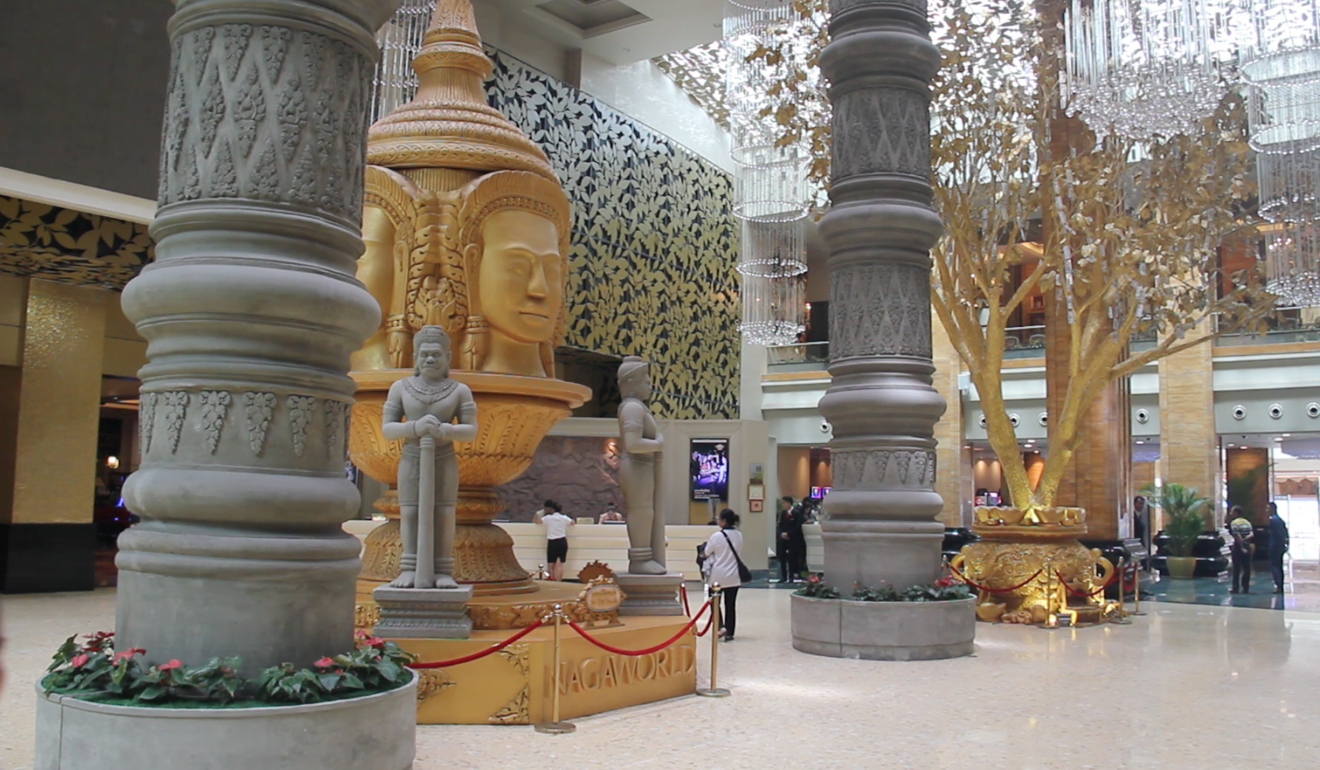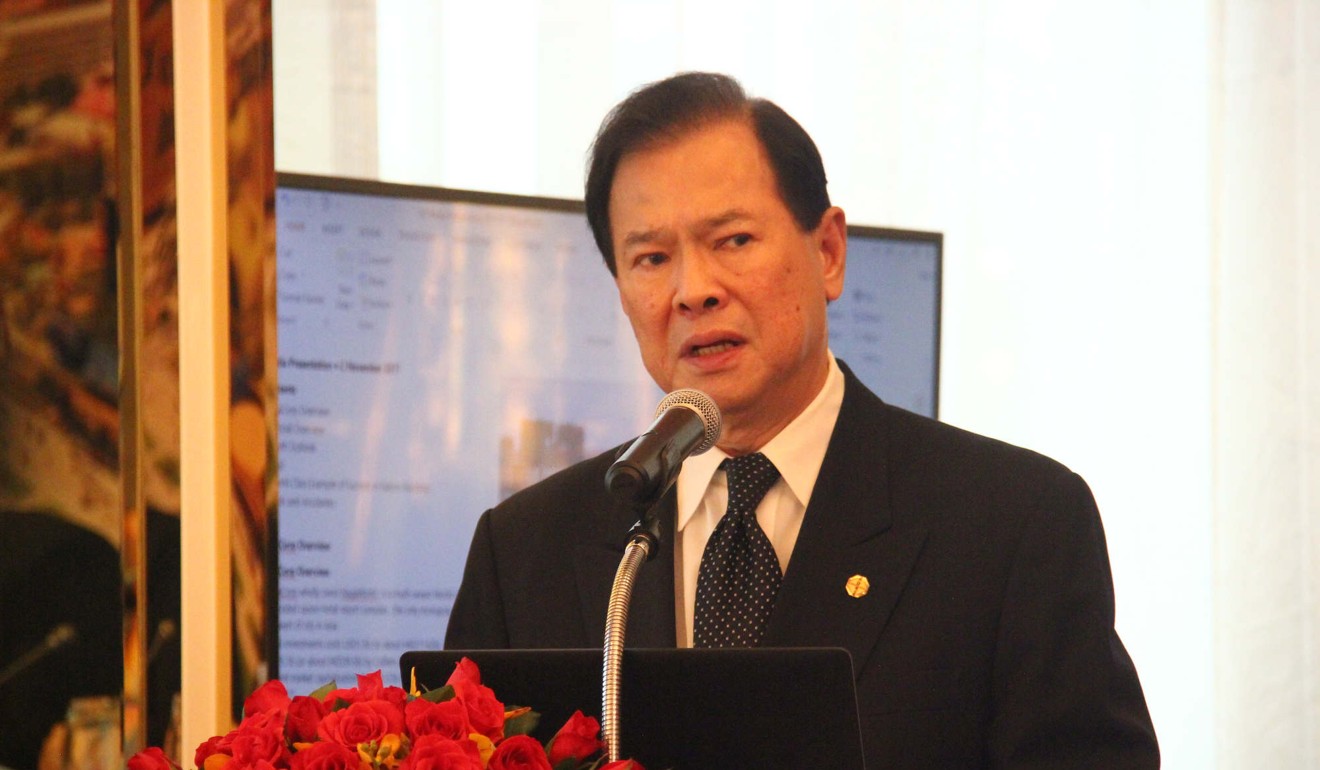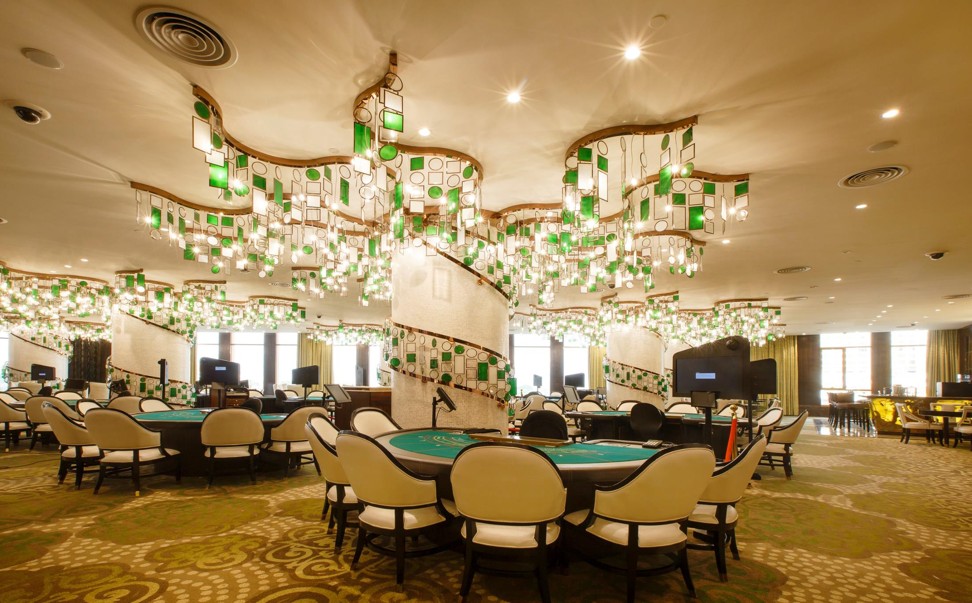
While Macau loses its lustre, a Cambodian casino bets on Chinese tourists to hit jackpot
Hong Kong-listed NagaCorp is counting on Chinese tourists to boost gaming revenue at its Cambodian casino, as the country targets 2 million Chinese visitors by 2020
Donning a gold, figure-hugging cheongsam, hotel receptionist Xie Ning gently presses her palms together in a prayer-like gesture and bows slightly.
In a serene fashion, the fresh college graduate from China’s south-western Sichuan province is extending a Buddhist blessing to a group of boisterous bag-grabbing guests in the brightly lit lobby of Naga2 in the heart of Phnom Penh, the capital of Cambodia.
Hong Kong-listed NagaCorp, which holds the monopoly on operating casino tables in the capital until 2035, recently soft-opened Naga2, the second phase of the existing NagaWorld, a hotel, gaming and entertainment complex that sits next to Cambodia’s foreign affairs ministry and National Assembly, near the Mekong River.
Xie is among a number of young Chinese women hired to man the hotel’s front desk.
While Xie, who is a few days into the job, struggles to communicate with English-speaking guests, her help is called upon when guests ask to be served in Mandarin.
And that happens a lot. The number of Chinese visitors has increased to account for over 20 per cent of the casino’s customer base in recent years, said Sean Tan, vice-president of NagaCorp.
“We used to have mostly Vietnamese guests,” Tan said. “But now the bulk of our customers are – you guessed it – mainland Chinese.”
The company, which operates charter flights between mainland Chinese cities and Phnom Penh, said the number of direct flights rose from 386 in 2013 to 580 this September.
NagaCorp’s expansion underscores the rising tide of Chinese tourists heading to Cambodia to shop, but also to gamble. The country collected US$48 million in taxes from its casino industry last year, the Khmer Times reported, a 40 per cent increase from 2015.
NagaWorld is not only doubling its capacity – Naga2 is adding 300 new gaming tables, 2,500 slot machines and 903 rooms – but also building an environment that resonates with its Chinese guests.
This is evident at every turn. Aside from the Chinese-character signs spread around the entire complex’s grounds, the lobby’s centrepieces are huge gold sculptures of a four-faced Buddha, regarded as a deity for good fortune, and a towering money tree whose gold leaves flutter with the breeze. A VIP club is named Jin Lai Hui, which means “come money, come” and duty free shops are run by China Duty Free Group.

The latter’s gaming revenue in 2014 took a nosedive as President Xi Jinping’s anti-corruption campaign began to fire on all cylinders. Close scrutiny of spending, travelling and capital outflows of Chinese citizens, especially those holding power, kept high rollers away from the Asian gaming hub.
But now the bulk of our customers are ... mainland Chinese
Macau’s casino revenues declined for 26 consecutive months from June 2014 to July 2016. They dropped 34.3 per cent to a five-year low of 230.84 billion patacas (US$28.92 billion) in 2015, according to official data.
From January 2014 to July 2017, the market values of Sands China, Wynn Macau and MGM China Holdings fell by more than 40 per cent, and SJM Holdings plummeted as much as 74 per cent. NagaCorp’s market capitalisation, in contrast, soared more than 40 per cent.
“As China visitation climbed 44 per cent year on year in just the first eight months this year, we are positive this trend will continue quite robustly,” Tan said.
“China is still a very new market to us. We only penetrated it two or three years ago.”
To deepen that penetration, NagaCorp’s founder and chief executive Chen Lip Keong said the company planned to build more casinos in countries around China, including Russia, Mongolia, Kazakhstan and Nepal.

It curves around China [...] and the north-eastern part of Russia, and the north of Mongolia
The company is pushing forward the construction of a casino resort near the Russian Far East city of Vladivostok, about 180 kilometres from northeast China.
Chen, who has stayed beneath the media radar for the past 20 years, also said the company had met the prime minister of Mongolia and the first deputy prime minister of Kazakhstan about developments in those two countries.
Tan said the company wanted to expand in these countries because they saw that Macau’s penetration rate beyond southeast China “is still not high”, which means the opportunities lie in the northern and western Chinese provinces.
Until now, NagaWorld’s business has been driven mainly by mass gaming, but Tan said the company had set its sights on netting more high rollers.
Angela Han Lee, equity research vice-president at China Merchants Securities, said: “So far, 70 per cent of NagaWorld’s VIP clients are from Malaysia, and Chinese VIP business is ramping up with improving connectivity to the second- and third-tier cities.”

So far, 70 per cent of NagaWorld’s VIP clients are from Malaysia, and Chinese VIP business is ramping up with improving connectivity to the second- and third-tier cities
Last year, 830,000 Chinese tourists visited Cambodia, representing a 19.5 per cent increase from 2015, and accounting for 16.6 per cent of the total number of international tourists for the year, according to Ministry of Tourism data. But the government aims to increase annual Chinese arrivals to two million by 2020.
At present, NagaCorp contributes about 3 per cent of Cambodia’s gross domestic product and is indisputably the dominant player in the gaming industry out of the 69 licensed casino operators in the country, a number of which are on its border with Vietnam.
A border town named Bavet is home to 12 casinos, where the bulk of the gamers are Vietnamese and Chinese.
On a larger scale, Cambodia is only one of the emerging gaming destinations. Singapore, Malaysia and the Philippines are all building their casino sectors.
But capturing the Chinese crowd is no easy feat – gambling is illegal in mainland China, in spite of Macau, a Special Administrative Region of China. Gaming companies are not allowed to overtly advertise to those who live in the mainland.
Last year, China detained 19 employees of Australian casino Crown Resorts, including three Australians, who were luring high rollers on the ground in the mainland. The group pleaded guilty to “gambling crimes” in June this year.
Earlier this year, Crown sold its remaining stakes in Macau, exiting the territory completely.
When asked what was NagaCorp’s key to penetrating the China market amid the sensitivity around gaming, Tan said, “Tourism, tourism and tourism.”

